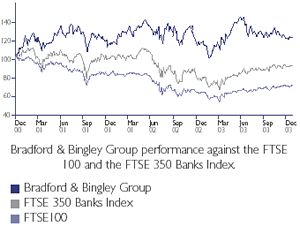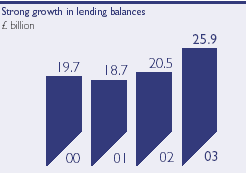|
|
|
|
Chairman's Statement |
|
“Looking to the future
we aim to maintain our strong position within our chosen lending markets
and to test other areas of specialist mortgage lending.”
Rod Kent Chairman
Group profit before tax and exceptionals declined 4% to £263.0 million and earnings per share fell slightly from 29.3 pence to 28.7 pence. Nonetheless, Bradford & Bingley has had a successful year.
Exceptional charges, which were £32.6 million in 2002, fell to zero in 2003. As a result, Group profit before tax rose 9% to £263.0 million. Basic earnings per share rose 6.4 pence (25%) to 32.3 pence. Of this increase, 3.6 pence arose from the release of a taxation provision for conversion costs.
The Group balance sheet grew strongly from £25.4 billion to £32.2 billion, reflecting the success of our lending business which increased balances 26% to £25.9 billion.
Dividend
The Board is pleased to propose a final dividend of 11.0 pence
per share for payment on 7 May 2004 to shareholders on the register as
at 26 March 2004. If approved, the full year dividend for 2003 would be
16.5 pence. Future dividends will be balanced by the capital requirements
of our growing lending book.
Lending
The Group continued the transformation of its main mortgage Lending business
from a traditional building society mortgage book to a portfolio of selective
residential mortgages and commercial property lending. Our loan portfolio
grew £5.3 billion in the year, £3.9 billion of the growth was organic
and £1.4 billion came from mortgage portfolio acquisitions.The main growth
came from the buy-to-let market.This is a market in which we are a leading
player and one we understand well.We also saw a significant increase in
our Commercial Property lending portfolio.
Over the last three years our lending strategy, which has been very successful, has been to replace high margin traditional mortgage lending, which was redeeming across the industry at a fast rate, with a portfolio of selective secured lending.The margins on selective lending are lower than those achieved on the old building society back book but above margins on new mainstream mortgage loans.
During this crucial transition period, our net interest income has remained within a narrow range. But, given the growth in lending balances which we achieved this year, and assuming no abnormal economic circumstances, we expect our net interest income will once again grow in 2004, particularly in the second half.
Looking to the future we intend to maintain our strong market position within our chosen lending areas and to test other areas of specialist mortgage lending. As a Group, we have made the deliberate decision to transact only secured lending and not to enter the higher risk, unsecured personal lending market.This sets us apart from many of our competitors.
Savings
Our Savings business performed satisfactorily. Balances remained stable
in a difficult year, which saw high levels of competition and, for most
of the year, a declining interest rate environment.The turning point in
interest rates last autumn should help release some of the margin compression
in the business and we are currently refreshing our product range.
Relative share price performance
since flotation
 |
 |
Treasury
Our Treasury team supported the strong growth in our Lending business
by sourcing funds from UK and international markets to meet the demands
of our growing balance sheet.
Distribution
Our capital intensive Lending business is complemented by a diverse range
of property and financial services businesses which require little capital.These
related businesses include Estate Agency, Surveying and the broking of
a wide range of mortgage, investment and insurance products.
These businesses contribute a small but important share of our earnings and enhance the Group’s return on capital. Over the last three years they have contributed between 4% and 12% of Group profit before tax.
This changing earnings pattern reflects the volatile dynamics of some of the underlying markets.We benefit from strong market positions in many of these businesses which we plan to exploit in future years.We are the largest mortgage broker in the UK, the fifth largest residential estate agent and the third largest residential surveying firm.
Our Distribution businesses delivered a mixed performance in 2003. Overall profit contribution was substantially down. Mortgage broking and Surveying performed well throughout the year. Estate Agency was hit by the sudden slow down in the Spring, but recovered in the second half, while investment product income was substantially down throughout the year in line with the rest of the market.
Regulation
The increase in regulatory activity continues and we are faced with a
significant number of regulatory changes in the coming year.The introduction
of new regulations in the mortgage market will have a particular impact.
Increasing regulation and the corresponding growth in the compensation culture has become a fact of life in our business and the Group’s task is to try to anticipate and keep ahead of the changes.
Whilst we are supportive of proper regulation in general, it comes at a cost.The additional expenditure needed for training, new systems and reviews of past business increased costs in 2003 and will continue to impact the business in 2004.
Board
Over the year we have made several changes to the Board. Robert Dickie,
Group Operations Director and Ian Darby, Group Commercial Director were
appointed as Executive Directors.
Stephen Webster, Ian Cheshire and Louise Patten joined the Board as Non-executive Directors.
George Cox has taken on the role of Senior Independent Director.
The Board now consists of myself as Non-executive Chairman, five Non-executive Directors and five Executive Directors.
I would like to express my sincere thanks to the three Non-executive Directors who retired during the year. All of them had given many years of service to the Company. Diana Courtney (10 years), Mark Smith (9 years) and Trevor Lewis, the Vice Chairman (13 years), all played a crucial role in the conversion of Bradford & Bingley into a FTSE 100 company.
People
Over the last few years the Group has demutualised, become a plc, entered
the FTSE 100 and responded to significant changes in the markets we serve.
Change is now a way of life and our staff deserve to be congratulated
for their performance, as do the committed senior management team who
have led these changes.
Outlook
Bradford & Bingley starts 2004 with good momentum across its businesses
and a major programme of regulatory change to manage. We are expecting
a stable property market, improving savings market and some return in
demand for investment products.The benefits of growing our selective lending
book will become evident in our 2004 results, particularly in the second
half and beyond.
Rod Kent
Chairman
